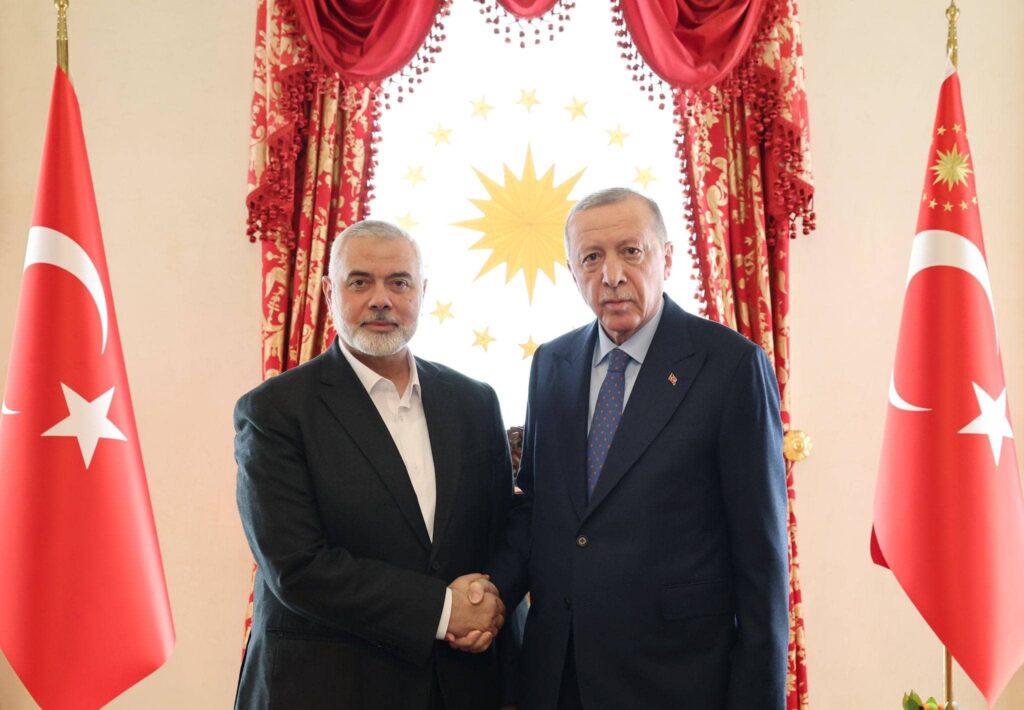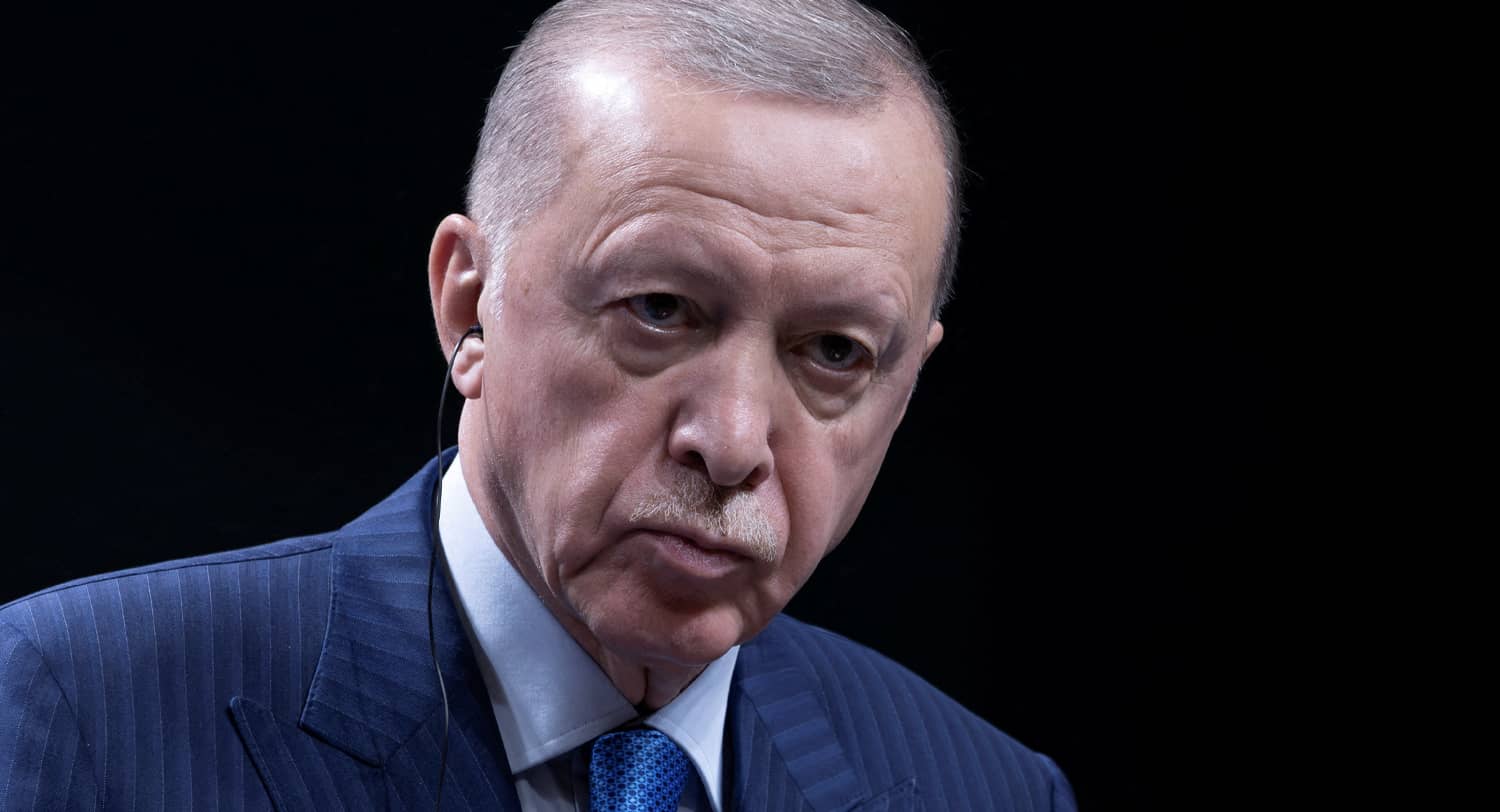Turkish president Recep Tayyip Erdoğan has a rocky relationship with Israel and bilateral relations have currently reached a nadir. But Erdoğan pursues a transactional foreign policy in general and, if interests re-align, he could once again restore robust relations with Israel.
A long-time supporter of Hamas, Erdoğan bitterly criticized Israel’s 2008 incursion into Gaza that took place shortly after Israeli Prime Minister Ehud Olmert visited Ankara. Two years later, Turkey severed diplomatic relations with Israel in the aftermath of the 2010 Mavi Marmara incident, named after a ship in the flotilla sponsored by the Turkish Foundation for Human Rights and intending to break the Israeli blockade of the Gaza Strip. Nine Turkish citizens died and others were injured when Israeli naval special forces boarded the ship.
When he broke off relations in 2010, however, Erdoğan did not interfere with Turkish-Israeli trade, which at the time amounted to a total two-way volume of $3.5 billion. In 2016, Erdoğan reversed himself, Ankara re-established formal ties with Israel, and trade nearly tripled between the two countries. Israel’s exports to Turkey amounted to $2.3 billion in 2022, the last full year before the current Hamas war; Turkish exports to Israel that year totaled $7 billion. They dropped to $5.4 billion in 2023, owing no doubt at least in part to the outbreak of the Gaza war.
Even after the 2023 dip in trade, Turkey remained Israel’s fourth largest trading partner. And two-way Turkey-Israel trade was the largest non-hydrocarbon trading relationship in the Middle East (where regional integration is thin overall).
Political relations also continued to warm prior to the Gaza war. Erdoğan welcomed Israeli president Isaac Herzog to Ankara in March 2022, calling the visit “historic” and a “turning point” between the two states; it was the first such visit in fifteen years. Nevertheless, it came as no surprise that Erdoğan bitterly criticized Israel’s response to the October 7 Hamas attack.
The tone of Erdoğan’s attacks has become ever more venomous. He has spoken of Israeli genocide and subsequently asserted that Israel was running ”Nazi camps.” Still, for several months after the onset of the conflict, he appeared to give the terrorist organization little more than verbal support.
Turkey did cancel joint events and Erdoğan recalled his ambassador to Israel for “consultations” but trade with the Jewish state continued at or near pre-war levels until April 2024, when, arguing that it needed to inspect all goods entering Gaza, Israel prohibited Turkish cargo aircraft from dropping humanitarian supplies to the embattled Strip. Ankara immediately retaliated by imposing restrictions on exports to Israel of 54 products including aluminum, steel, construction products, jet fuel and chemical fertilizers. Israel in turn banned some Turkish products.
Even then some trade continued apace, until the first days of May, when Erdoğan announced a complete export cut off – although refraining from immediate implementation of the measure. The Turkish Ministry of Trade gave companies three months to fulfill their existing orders, via third countries. In addition, and perhaps more revealing of Ankara’s economic priorities, Turkey said it was stopping exports to Israel only during the duration of the Gaza war.

The war could end before the three-month deadline comes into force, and normal trade relations could resume in the wake of a ceasefire in Gaza. There is growing pressure on Prime Minister Benjamin Netanyahu, both inside Israel and from Washington and Europe, to terminate the conflict in exchange for the release of hostages and Saudi recognition of Israel. That pressure has intensified with both Defense Minister Yoav Gallant’s public criticism of Netanyahu’s management of the war followed by former Defense and Deputy Prime Minister Benny Gantz’s threat to leave the war cabinet and the governing coalition on June 8. Should the war end, or Netanyahu’s government fall before August, Erdoğan may well reverse himself once more, as he has done in the past.
Israel retaliated against Erdoğan’s ban. Less than three weeks after the Turkish president’s announcement, Finance Minister Bezalel Smotrich, whose Religious Zionist party constitutes a far-right pillar of the Netanyahu coalition government, announced that Israel would revoke its free trade agreement with Turkey. Moreover, unlike the Turkish ban, Smotrich’s announcement indicated that Israel’s withdrawal from the free trade agreement would remain in force as long as Erdoğan remained president of Turkey – at least through his five-year term that ends in 2028. Given previous levels of trade between the two countries, Ankara and Jerusalem were engaging in what could only be termed economic stupidity.
There are reasons for optimism about the future Israel-Turkey relationship. Both Israel and Turkey share interests in the Caucasus, where they support Azerbaijan’s Aliev regime. Israel supplied at least seventy percent of Baku’s armaments until 2020. In 2023 Israel supplied Baku with weapons that contributed to its successful seizure of the hotly contested Nagorno-Karabakh region. Turkey has furnished the Azeris with Turkish arms and conducted joint military exercises since 2020. And Ankara has provided political support to Baku in its conflict with Armenia ever since Azerbaijan achieved its independence after the collapse of the Soviet Union.
Iran also maintains neighborly relations with Azerbaijan, but it publicly protests the country’s relations with what it calls the “Zionist entity.” In contrast, Erdoğan has said little about Israeli-Azeri relations. [Iranian president Ibrahim Raisi died returning via helicopter from a ceremony on the Iranian-Azeri border to mark the completion of the Qiz-Qalasi Dam, a joint project between the two countries, and the third such jointly constructed dam.]
The conditions placed on Ankara’s limited trade cutoff with Israel, like Erdoğan’s relative silence on Israel-Azerbaijan ties, indicate that the Turkish strongman has not ruled out the possibility of yet another about-face in his relations with the Jewish state.



